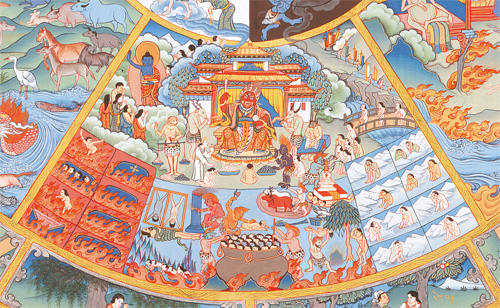Eighteen hells: Difference between revisions
Jump to navigation
Jump to search
mNo edit summary |
No edit summary |
||
| (7 intermediate revisions by 3 users not shown) | |||
| Line 1: | Line 1: | ||
[[Image:Hell_realm.jpg|frame|Depiction of the hell realms from a [[thangka]] of the [[Wheel of Life]]]] | [[Image:Hell_realm.jpg|frame|Depiction of the hell realms from a [[thangka]] of the [[Wheel of Life]]]] | ||
The '''hells''' (Skt. ''naraka''; Tib. དམྱལ་བ་, [[Wyl.]] ''dmyal ba'') constitute one of the realms of the [[six classes of beings]], they are characterized by extremely intense suffering | The '''hells''' (Skt. ''naraka''; Tib. དམྱལ་བ་, ''nyalwa'', [[Wyl.]] ''dmyal ba'') constitute one of the realms of the [[six classes of beings]], they are characterized by extremely intense suffering. The hell realms are as real or as illusional as the human realm. It is important within our mind training to reflect upon the intense suffering of the hell beings, in order to strengthen our [[bodhicitta]] and our [[renunciation]]. There are '''eighteen hells''' (Skt. ''aṣṭadaśanaraka''): | ||
*the [[sixteen hells]] grouped into | *the [[sixteen hells]] grouped into | ||
| Line 9: | Line 9: | ||
[[Chökyi Drakpa]] writes: | [[Chökyi Drakpa]] writes: | ||
:The '''cause''' of being born in any of these eighteen hells could be a vast accumulation of harmful actions perpetrated out of desire or delusion. Even so, a single momentary act such as taking life or speaking harsh words to an exceptional being, when carried out with a mind of intense anger, will propel you straight to the hells.<ref>In ''[[A Torch for the Path to Omniscience]]''</ref> | :The '''cause''' of being born in any of these eighteen hells could be a vast accumulation of harmful actions perpetrated out of [[desire]] or delusion. Even so, a single momentary act such as taking life or speaking harsh words to an exceptional being, when carried out with a mind of intense anger, will propel you straight to the hells.<ref>In ''[[A Torch for the Path to Omniscience]]''</ref> | ||
==Notes== | ==Notes== | ||
| Line 15: | Line 15: | ||
==Further Reading== | ==Further Reading== | ||
*[[Patrul Rinpoche]], ''[[The Words of My Perfect Teacher]]'' (Boston: Shambhala, Revised edition, 1998), pages 63-72 | *Samuel Bercholz and Pema Namdol Thaye, ''A Guided Tour of Hell—A Graphic Memoir'' (Boston & London: Shambhala Publications, 2016) | ||
*[[Patrul Rinpoche]], ''[[The Words of My Perfect Teacher]]'' (Boston: Shambhala, Revised edition, 1998), pages 63-72, ISBN 978-0300165326 | |||
==Internal Links== | ==Internal Links== | ||
| Line 24: | Line 25: | ||
[[Category: Hell Realms]] | [[Category: Hell Realms]] | ||
[[Category: Three Realms]] | [[Category: Three Realms of Samsara]] | ||
[[Category: Enumerations]] | [[Category: Enumerations]] | ||
[[Category:18-Eighteen]] | [[Category: 18-Eighteen]] | ||
Latest revision as of 20:12, 31 December 2017

The hells (Skt. naraka; Tib. དམྱལ་བ་, nyalwa, Wyl. dmyal ba) constitute one of the realms of the six classes of beings, they are characterized by extremely intense suffering. The hell realms are as real or as illusional as the human realm. It is important within our mind training to reflect upon the intense suffering of the hell beings, in order to strengthen our bodhicitta and our renunciation. There are eighteen hells (Skt. aṣṭadaśanaraka):
- the sixteen hells grouped into
- Eight Hot Hells and
- Eight Cold Hells; along with
- the Neighbouring Hells and
- the Ephemeral Hells.
Chökyi Drakpa writes:
- The cause of being born in any of these eighteen hells could be a vast accumulation of harmful actions perpetrated out of desire or delusion. Even so, a single momentary act such as taking life or speaking harsh words to an exceptional being, when carried out with a mind of intense anger, will propel you straight to the hells.[1]
Notes
Further Reading
- Samuel Bercholz and Pema Namdol Thaye, A Guided Tour of Hell—A Graphic Memoir (Boston & London: Shambhala Publications, 2016)
- Patrul Rinpoche, The Words of My Perfect Teacher (Boston: Shambhala, Revised edition, 1998), pages 63-72, ISBN 978-0300165326